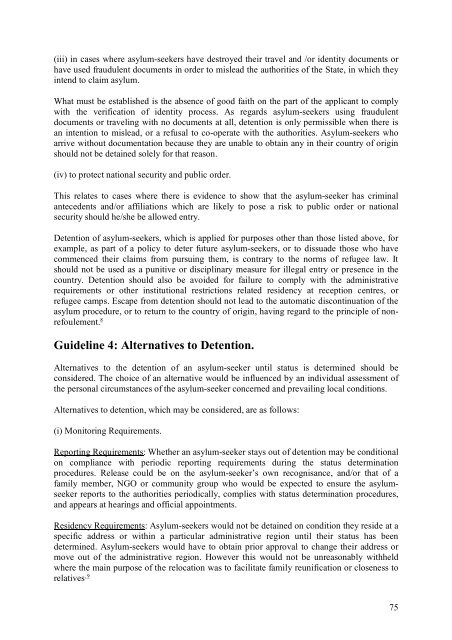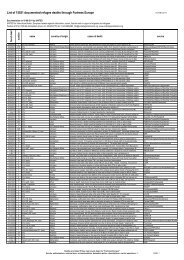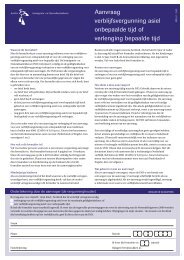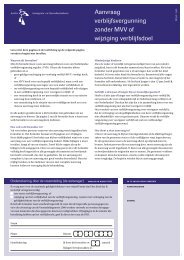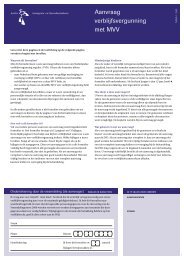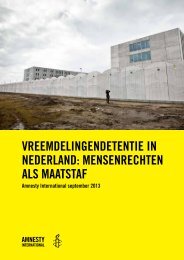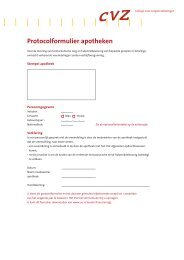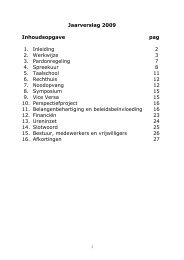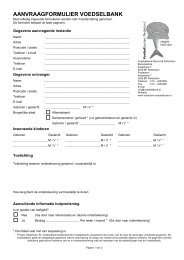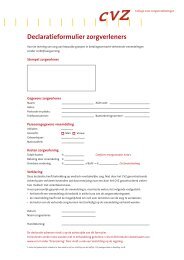Handboek voor begeleiders van vluchtelingen en ... - Stichting ROS
Handboek voor begeleiders van vluchtelingen en ... - Stichting ROS
Handboek voor begeleiders van vluchtelingen en ... - Stichting ROS
Create successful ePaper yourself
Turn your PDF publications into a flip-book with our unique Google optimized e-Paper software.
(iii) in cases where asylum-seekers have destroyed their travel and /or id<strong>en</strong>tity docum<strong>en</strong>ts or<br />
have used fraudul<strong>en</strong>t docum<strong>en</strong>ts in order to mislead the authorities of the State, in which they<br />
int<strong>en</strong>d to claim asylum.<br />
What must be established is the abs<strong>en</strong>ce of good faith on the part of the applicant to comply<br />
with the verification of id<strong>en</strong>tity process. As regards asylum-seekers using fraudul<strong>en</strong>t<br />
docum<strong>en</strong>ts or traveling with no docum<strong>en</strong>ts at all, det<strong>en</strong>tion is only permissible wh<strong>en</strong> there is<br />
an int<strong>en</strong>tion to mislead, or a refusal to co-operate with the authorities. Asylum-seekers who<br />
arrive without docum<strong>en</strong>tation because they are unable to obtain any in their country of origin<br />
should not be detained solely for that reason.<br />
(iv) to protect national security and public order.<br />
This relates to cases where there is evid<strong>en</strong>ce to show that the asylum-seeker has criminal<br />
anteced<strong>en</strong>ts and/or affiliations which are likely to pose a risk to public order or national<br />
security should he/she be allowed <strong>en</strong>try.<br />
Det<strong>en</strong>tion of asylum-seekers, which is applied for purposes other than those listed above, for<br />
example, as part of a policy to deter future asylum-seekers, or to dissuade those who have<br />
comm<strong>en</strong>ced their claims from pursuing them, is contrary to the norms of refugee law. It<br />
should not be used as a punitive or disciplinary measure for illegal <strong>en</strong>try or pres<strong>en</strong>ce in the<br />
country. Det<strong>en</strong>tion should also be avoided for failure to comply with the administrative<br />
requirem<strong>en</strong>ts or other institutional restrictions related resid<strong>en</strong>cy at reception c<strong>en</strong>tres, or<br />
refugee camps. Escape from det<strong>en</strong>tion should not lead to the automatic discontinuation of the<br />
asylum procedure, or to return to the country of origin, having regard to the principle of nonrefoulem<strong>en</strong>t.<br />
8<br />
Guideline 4: Alternatives to Det<strong>en</strong>tion.<br />
Alternatives to the det<strong>en</strong>tion of an asylum-seeker until status is determined should be<br />
considered. The choice of an alternative would be influ<strong>en</strong>ced by an individual assessm<strong>en</strong>t of<br />
the personal circumstances of the asylum-seeker concerned and prevailing local conditions.<br />
Alternatives to det<strong>en</strong>tion, which may be considered, are as follows:<br />
(i) Monitoring Requirem<strong>en</strong>ts.<br />
Reporting Requirem<strong>en</strong>ts: Whether an asylum-seeker stays out of det<strong>en</strong>tion may be conditional<br />
on compliance with periodic reporting requirem<strong>en</strong>ts during the status determination<br />
procedures. Release could be on the asylum-seeker’s own recognisance, and/or that of a<br />
family member, NGO or community group who would be expected to <strong>en</strong>sure the asylumseeker<br />
reports to the authorities periodically, complies with status determination procedures,<br />
and appears at hearings and official appointm<strong>en</strong>ts.<br />
Resid<strong>en</strong>cy Requirem<strong>en</strong>ts: Asylum-seekers would not be detained on condition they reside at a<br />
specific address or within a particular administrative region until their status has be<strong>en</strong><br />
determined. Asylum-seekers would have to obtain prior approval to change their address or<br />
move out of the administrative region. However this would not be unreasonably withheld<br />
where the main purpose of the relocation was to facilitate family reunification or clos<strong>en</strong>ess to<br />
relatives . 9<br />
75


